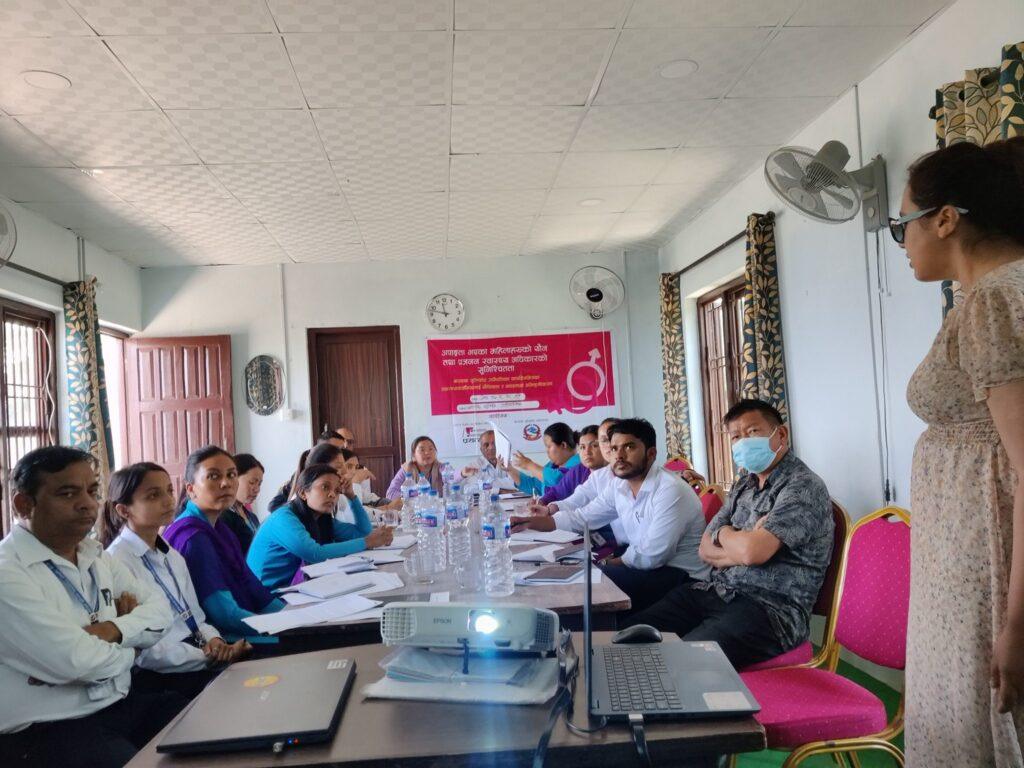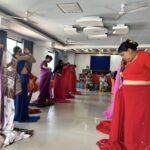
Prayatna Nepal is the self-help organization working for empowering the living condition women and girls with visually impairments. The organization is established by the composition of both women with and without visually impairments. Among the seven board members, five of them (71%) are with visually impairments where the organization is led by the totally blind woman as the Chairperson. This idea of inclusion in the organizational structure is to ensure equal efforts from every individual with better understanding in improving social, cultural, economic and political aspects of lives of women with disabilities.
On the first day, Mr. Moda Raj Bhatta, chief of health section of Barpak Sulikot Rural Municipality formally commenced the orientation program by welcoming everyone. He then invited Mr. Tulasi Acharya, chief administrative officer of Barpak Sulikot Rural Municipality to address the welcome remarks and motivate the participants. He also invited Mr. Bishnu Bhatta, chairperson of Barpak Sulikot Rural Municipality to inaugurate the program by reading aloud the banner content and give his welcome remarks. After this, he invited Ms. Sarita Lamichhane, chairperson of Prayatna Nepal, who highlighted the objectives of the orientation. After this, Mr. Moda Raj proceeded to the introduction session where the participants and representatives present were asked to state their names and designation. After this, he concluded the formal welcome session and opened the floor to Ms. Sarita Lamichhane. Before beginning her session, she requested the logistics support team from Prayatna Nepal to distribute pre-test questions to individual participants in order to analyze the basic knowledge on Disability and Sexuality. After collecting pre-test answers, she requested the participants to nominate one participant among themselves as reporter (who would share overall learnings of the training), one timekeeper (who would take notice of the time during sessions and breaks) and one evaluator (who would evaluate overall sharing of the training). She then started her session on Concept and Models of Disability. Initially, she engaged the participants in group work to understand their individual as well as group understanding on disability. After the group discussion and presentation, she played an informative video documentary on types of disability based on severity and functional limitations. Her session was basically focused on accessibility and universal design to ensure inclusion of persons with disabilities. She also talked about societal judgments and notions on SRHR and sexuality of persons with disabilities. She then engaged the participants in a game to energize them as well as sensitize them on importance of accessible health related information and services to persons with disabilities which can be achieved by following universal design. After the interesting practical session, the participants unanimously agreed that ensuring accessibility can promote inclusion of persons with disabilities in all sectors including health.
On the second day, the training started with participants sharing what they learnt on the previous day, where the reporter engaged all the participants in sharing various individual topics through a game. The reporter made a list of questions and made individual participants pick one question and give an answer to it. After that, Ms. Sarita Lamichhane invited and introduced facilitator, Mr. Moda Raj Bhatta, to take over for his session on different health service-related provisions of Barpak Sulikot Rural Municipality specifically targeted to the SRHR needs of women with disabilities. He also highlighted some statistics of persons with disabilities in the rural municipality area. The next session was taken by Mr. Krishna Bhatta on conceptual clarity on reproductive health services. His session included discussions on reproductive health rights and their components. He also talked about reproductive health rights care and inclusive SRHR in context of Nepal. Then, Ms. Sarita Lamichhane presented on national policies related to persons with disabilities. Her session was mostly based on present situation of persons with disabilities in Nepal. Adding on to Mr. Moda Raj's session, she shared international and national laws and policies that address the issues and rights of persons with disabilities. In her presentation, she highlighted that disability is not illness or crime, but it is a situation and can happen to anyone at any time. She then proceeded to talk about provisions of Convention on the Rights of Persons with Disabilities (CRPD), Constitution of Nepal, Acts and Rules on the Rights of Persons with Disabilities, Local Government Operation Act and their roles. Her presentation briefly highlighted that local government is accountable and responsible to abide by all the international and national policies in order to ensure inclusive and participative human rights of persons with disabilities.
At the end of the second day, Ms. Sarita Lamichhane asked the participants to fill up post-test questionnaires which showed remarkable increase in knowledge and understanding on Disability and Sexuality among the health workers. The participants were also asked to submit feedback so as to ensure better program organization in future by Prayatna Nepal. She then asked the participants to share their feelings about the orientation individually. After the sharing session, Mr. Krishna Bhatta moderated the formal closing session and welcomed Mr. Moda Raj Bhatta on behalf of Barpak Sulikot Rural Municipality to share his experience and two participants to share overall learning. He also invited Ms. Sarita Lamichhane to share her feelings of two-days facilitation and organizing the program on behalf of Prayatna Nepal. Lastly, he then invited Mr. Tulasi Acharya to conclude the program with his closing remarks.


